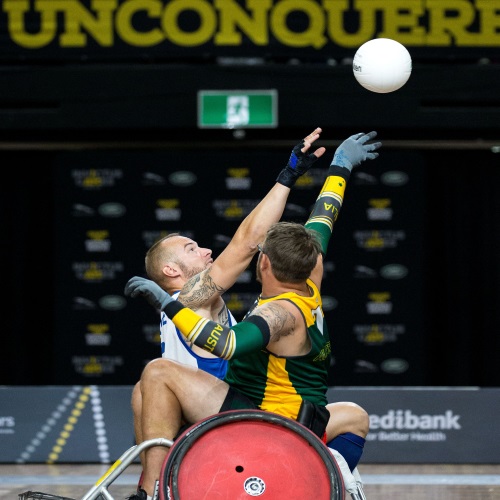28 October 2019
 When Invictus Games athletes stand proudly on the podium to receive their medals, there is often little indication of struggle they have faced with a range of physical and mental health issues associated with their service as veterans and civilian first responders.
When Invictus Games athletes stand proudly on the podium to receive their medals, there is often little indication of struggle they have faced with a range of physical and mental health issues associated with their service as veterans and civilian first responders.
The statistics tell the story – more than 20 per cent of transitioned Australian Defence Force personnel think about suicide and emergency services responders (police, firefighters, paramedics) are twice as likely to have suicidal thoughts as the general population.
The impact of service in extreme environments and circumstances for those who serve is often an increased incidence of depression, post-traumatic stress, anxiety, anger and alcohol abuse.
But programs like the Invictus Pathways Program (IPP) are making an important contribution to both medical and physical recovery for veterans and first responders.
The world first individually-tailored training and fitness support program undertaken at the University of South Australia with continued support from The Road Home, has been a critical step in the journey to recovery for a cohort of South Australian Invictus alumni and hopefuls.
IPP participants are trained in UniSA’s high performance centre and allied health clinics by final-year health sciences students across a range of disciplines, with additional access to the expertise of UniSA health professionals and researchers.
For Navy Officer and 2018 Invictus Games silver medallist, Vanessa Broughill, the IPP has played an integral role in her ongoing recovery from diagnosed depression and anxiety.
“After my time serving with both the army and navy, I’ve been left with a number of physical injuries that have required multiple surgeries and years of physiotherapy and rehabilitation just to get me back to some kind of normal,” Broughill says.
“Through the physical pain, I was also suffering in silence with invisible injuries that were harder to face and seek help for.
“I reached a point where I where I felt the only way to escape the overwhelming feeling that I was drowning was through self-harm, but luckily, I found the courage to ask for help, and part of that involved joining the IPP.”
Rehabilitation Consultant Brianna Farmer says her involvement with IPP while completing her Bachelor of Clinical Exercise Physiology at UniSA led her to her current job at Helping Heroes, working to improve the overall health of veterans.
“I saw amazing things happen in the IPP,” Farmer says.
“I saw participants go from not wanting to leave their house, to competing in front of tens of thousands of people at the 2018 Invictus Games.
“When servicewomen and men leave the military, there is a significant shift in their lives - they lose everything at once - their career, their social networks, and their residence.
“On top of this, they are often ‘broken’ physically or mentally from what they have experienced, and the IPP provides not just physical training and rehabilitation, but a chance for people to connect, set goals, and re-gain a purpose.
“The athletes who joined the IPP often talked about the huge change the program had made in their rehabilitation, and it was pretty common for them to say the IPP had literally saved their lives.”
Competing in eight events during the 2018 Sydney Invictus Games while founder Prince Harry and wife Meghan Markle watched from the stands, Broughill says the Games was just a bonus on the road to recovery.
“The Games was more of a celebration of everything I had achieved through working with the students and experts in the IPP, meeting people with similar experiences and improving my overall health.”
As part of The Road Home’s Global Alliance Conference on Post-Traumatic Stress on November 5 attendees, including David Wiseman, UK Invictus captain in 2016 and a close friend of Prince Harry and representative of The Royal Foundation of The Duke and Duchess of Cambridge and The Duke and Duchess of Sussex, will tour UniSA’s IPP facilities and meet with Pro Vice Chancellor and Head of the Invictus Pathways Program - Professor Roger Eston to see the IPP in action.
News editors please note: Veterans’ Health Week is 26 October – 3 November 2019, with a focus on ‘Mental Wellness’ as this year’s theme. On 21 October 2019, the IPP was officially transferred to the University of South Australia by The Road Home, which will provide ongoing support.
UniSA media contact: Michèle Nardelli phone: +61 418 823 673 or +61 8 8302 0966 email: michele.nardelli@unisa.edu.au




